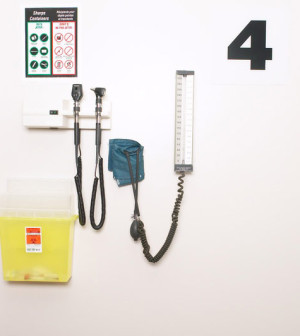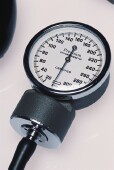- Could Artificial Sweeteners Be Aging the Brain Faster?
- Techniques for Soothing Your Nervous System
- Does the Water in Your House Smell Funny? Here’s Why
- Can a Daily Dose of Apple Cider Vinegar Actually Aid Weight Loss?
- 6 Health Beverages That Can Actually Spike Your Blood Sugar
- Treatment Options for Social Anxiety Disorder
- Understanding the Connection Between Anxiety and Depression
- How Daily Prunes Can Influence Cholesterol and Inflammation
- When to Take B12 for Better Absorption and Energy
- Epsom Salts: Health Benefits and Uses
Big Swings in Blood Pressure Could Spell Trouble


Wide blood pressure fluctuations may signal an increased risk of heart disease and early death, researchers say.
The large study of people taking blood pressure medication found that variations of more than 14 mm Hg in systolic blood pressure readings between doctor visits was linked to a 25 percent increased risk of heart failure. Systolic blood pressure is the top number in a blood pressure reading.
“Patients should have their blood pressure controlled,” said lead researcher Paul Muntner, a professor of epidemiology at the University of Alabama School of Public Health at Birmingham. “They should be aware that their blood pressure changes, and if there is a lot of variation, they might want to talk with their doctor about why it’s changing.”
These variations may be a sign of increasing damage to the arteries, particularly stiffening, Muntner said.
About one in three U.S. adults has high blood pressure, according to the American Heart Association.
For the study, published online July 27 in Annals of Internal Medicine, Muntner and colleagues analyzed data from a major trial involving the use of medicines to fight high blood pressure and high cholesterol. The trial involved nearly 26,000 people. Blood pressure readings were taken at five, six or seven visits which were conducted between six to 28 months after the start of the study.
Compared to patients whose blood pressure remained stable, the researchers found that an average blood pressure variation of about 15 mm Hg was linked to a 30 percent raised risk of heart attack or fatal heart disease, and a 46 percent raised risk of stroke. In addition, the risk for death from any cause was increased by 58 percent.
Because these findings are based on an analysis of data from a large study, Muntner stressed they can only show an association between heart disease, death and blood pressure variations, not a direct cause-and-effect relationship.
Some blood pressure medications, specifically calcium channel blockers and diuretics, are able to control blood pressure variations better than others, he said.
But Muntner said patients should not seek to change their medications, since there is not yet firm proof that curbing swings in blood pressure will prevent these problems.
High blood pressure is a leading contributor to heart attack, heart failure, stroke, kidney failure and premature death, added Dr. Gregg Fonarow, a professor of cardiology at the University of California, Los Angeles.
Lowering blood pressure to less than 140 mm Hg systolic and less than 90 mm Hg diastolic with medication and lifestyle changes is the long-standing treatment target, he said.
Some other studies have suggested that visit-to-visit variations in blood pressure readings are also associated with increased risk of heart disease and stroke, he added.
Further studies are needed to evaluate effective strategies for limiting visit-to-visit variability in blood pressure and the potential harms associated with it, Fonarow said.
“People with high blood pressure should focus on consistently maintaining their blood pressure in the goal range by consistently taking their medications and adhering to heart- and blood pressure-healthy diet and exercise,” he said.
More information
For more on blood pressure, visit the American Heart Association.
Source: HealthDay
Copyright © 2026 HealthDay. All rights reserved.










